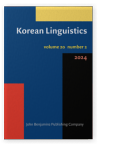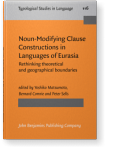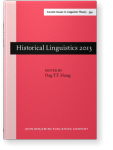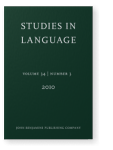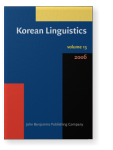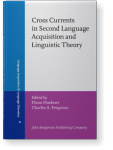Peter Sells
List of John Benjamins publications for which Peter Sells plays a role.
Journal
Title
Noun-Modifying Clause Constructions in Languages of Eurasia: Rethinking theoretical and geographical boundaries
Edited by Yoshiko Matsumoto, Bernard Comrie and Peter Sells
[Typological Studies in Language, 116] 2017. vi, 381 pp.
Subjects Semantics | Syntax | Theoretical linguistics | Typology
2017 Conclusion Noun-Modifying Clause Constructions in Languages of Eurasia: Rethinking theoretical and geographical boundaries, Matsumoto, Yoshiko, Bernard Comrie and Peter Sells (eds.), pp. 331–337 | Article
In this conclusion, we address three issues: a) the geographic extent of GNMCCs in Eurasia, including considerations of areal phenomena resulting from language contact; b) delimiting GNMCCs from other constructions, in particular those that in Japanese fall under GNMCCs; and c) structural… read more
2017 Noun-modifying constructions in Korean Noun-Modifying Clause Constructions in Languages of Eurasia: Rethinking theoretical and geographical boundaries, Matsumoto, Yoshiko, Bernard Comrie and Peter Sells (eds.), pp. 59–89 | Article
We survey clausal noun-modification examples in Korean, initially setting out constructions into these types: argument and adjunct NMCCs, content noun NMCCs, and a group of other extended NMCCs. We show that the range of interpretations of NMCCs in Korean is not quite as broad as Japanese, but… read more
2017 Noun-modifying clause constructions in languages of Eurasia: Rethinking theoretical and geographical boundaries Noun-Modifying Clause Constructions in Languages of Eurasia: Rethinking theoretical and geographical boundaries, Matsumoto, Yoshiko, Bernard Comrie and Peter Sells (eds.), pp. 3–21 | Article
2015 The syntax of mood constructions in Old Japanese: A corpus-based study Historical Linguistics 2013: Selected papers from the 21st International Conference on Historical Linguistics, Oslo, 5-9 August 2013, Haug, Dag T.T. (ed.), pp. 281–302 | Article
This paper investigates several mood constructions in Old Japanese, the language of eight-century Japan. We focus on imperative, prohibitive, and optative constructions, expressing the desire of the speaker for either the speaker or another entity to perform (or not) in an event or situation (cf.… read more
2010 Oblique case marking on core arguments in Korean Studies in Language 34:3, pp. 602–635 | Article
In this paper we present data from Korean in which the core arguments (subject and direct object) of a transitive clause may be suffixed with oblique postpositional markers rather than the usual nominative or accusative case markers. Unlike familiar cases of oblique arguments, such as dative… read more
2006 Honorification in Korean as Expressive Meaning Korean Linguistics 13, pp. 167–195 | Article
Abstract. Honorification in Korean elevates the social status of a participant in a clause with respect to the subject and/or the hearer. Honorific marking may occur as a nominal suffix, a special honor-ific form of a noun, an honorific case particle, an honorific marker on a verb, or a special… read more
1991 Recent trends in syntactic theory Cross Currents in Second Language Acquisition and Linguistic Theory, Huebner, Thom and Charles A. Ferguson (eds.), pp. 23–36 | Article
